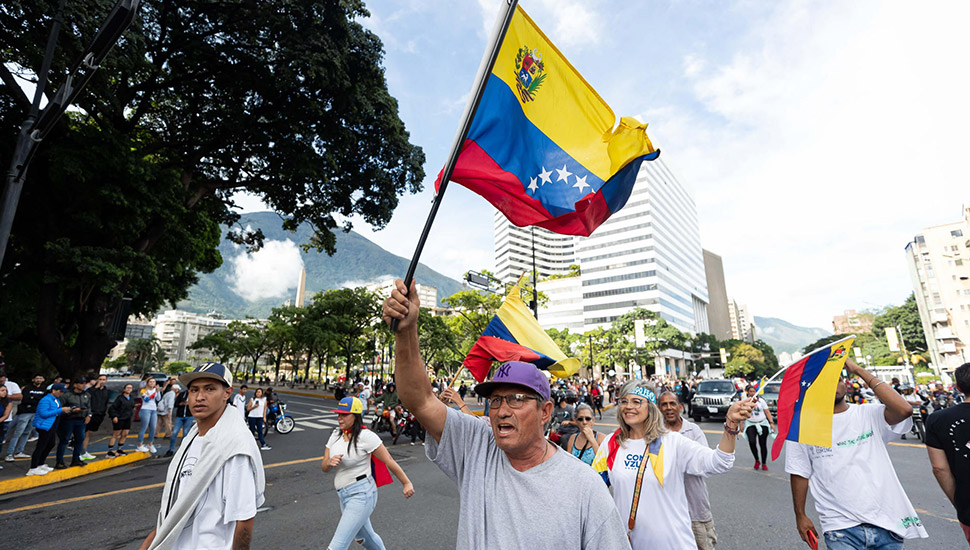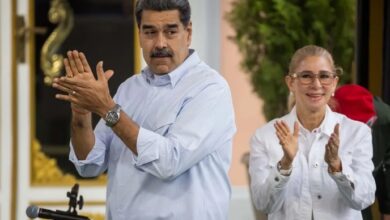Protests Erupt in Venezuela After Disputed Election Results

Venezuela’s recent election has sparked intense debate and unrest, with many questioning the legitimacy of President Nicolás Maduro’s re-election. The opposition fights for a new future as the country grapples with economic collapse and political turmoil.
The election on Sunday was the most consequential in years, with Venezuela’s future on the line. The country, plagued by economic collapse and violent repression under the authoritarian rule of Nicolás Maduro, faced a pivotal moment. Many young opposition supporters had vowed to leave the country if Maduro was re-elected, while the opposition presented the ruling establishment with its most formidable challenge in 25 years.
Despite Maduro’s promises of a fair and accessible election, the process was marred by allegations of foul play. Opposition figures were arrested, key leaders were banned from running, media outlets were blocked, and overseas Venezuelans were primarily unable to vote. Consequently, even though Maduro was formally named the winner by the country’s electoral body, which is stacked with the president’s allies, the opposition has rejected the results. Other Latin American leaders have also refused to recognize his victory.
Maduro, who has been in power since the 2013 death of his predecessor, Hugo Chávez, was seeking his third consecutive six-year term. His continuation in office would extend the reign of “Chavismo,” the left-wing populist ideology named after Chávez. The opposition, however, managed to unify its ranks and form a coalition, energizing a disillusioned populace desperate for change. The opposition candidate, former diplomat Edmundo Gonzalez, stepped in after the trendy leader Maria Corina Machado was barred from running due to allegations regarding her asset declaration.
Despite being barred, Machado remains a driving force behind the opposition, which has promised to restore democracy and rebuild the economy. This message resonated deeply in a country where economic strife has led some 8 million Venezuelans to flee overseas.
Disputed Results and Allegations of Fraud
The National Electoral Council (CNE) declared Maduro the winner late Sunday, with 80% of the ballots counted, stating that he had won 51.2% of the votes compared to Gonzalez’s 44.2%. However, the opposition rejected these results, claiming their tallies showed Gonzalez had won. They reported that over 73% of the tally sheets indicated over 6 million votes for Gonzalez and only 2.7 million for Maduro.
The opposition accused the CNE of various irregularities, including denying their witnesses access to the vote-counting process and halting data transmission from polling stations. These actions have only fueled suspicions of vote rigging, a charge the government has denied despite past accusations of manipulating turnout figures.
The Reaction on the Streets
Maduro’s supporters celebrated his win in parts of Caracas, but the capital also saw widespread protests by the opposition. Demonstrators marched through the streets, waving Venezuelan flags and chanting for liberty. Videos from across the country depicted the loud protests known as cacerolazos, where people bang pots and pans to show their discontent.
These protests, however, were met with repression. National Guard soldiers in riot gear used tear gas and batons against the mostly peaceful protesters. Many Venezuelans desire peace and change, calling for continued demonstrations. Despite the government’s harsh crackdown, Gonzalez and Machado have encouraged the protests to remain peaceful.
International Response and Future Implications
The international community has largely responded with skepticism regarding the election results. The United States, along with several European and Latin American countries, has cast doubt on the legitimacy of Maduro’s victory. US Secretary of State Antony Blinken emphasized the need for transparency and fairness in the vote-counting process. Several countries, including Argentina, Chile, Costa Rica, Peru, Panama, the Dominican Republic, and Uruguay, refused to recognize the results and saw their diplomatic staff expelled from Venezuela.
In contrast, Maduro’s close allies, such as China, Cuba, Iran, and Russia, quickly congratulated him on his victory. This divide highlights the complex geopolitical implications of Venezuela’s political crisis.
The Roots of Venezuela’s Crisis
Venezuela’s current turmoil stems from a severe economic and political crisis. Once the fifth-largest economy in Latin America, Venezuela has experienced a catastrophic decline. A crash in oil prices, combined with corruption and mismanagement, has led to chronic shortages of vital goods and soaring inflation. This dire situation has forced millions to flee the country.
The US and European Union have imposed sanctions on Maduro’s regime, which he has blamed for the country’s economic woes, describing it as an “economic war.” Maduro had pledged to hold fair elections in exchange for sanctions relief, but the disputed election results have cast doubt on Venezuela’s ability to return to the international stage.
Ongoing Protests and Government Crackdown
Fresh protests erupted in Caracas following the election, with thousands gathering to oppose Maduro’s claim of victory. Many vowed not to stop until there was a new government, expressing hope that the security forces might join the opposition. However, the military and police have remained loyal to Maduro, using tear gas and rubber bullets against protesters.
Local officials reported around 750 arrests, with NGOs noting several deaths and dozens of injuries. The protests have been described by Venezuela’s defense minister as a “coup,” with Maduro receiving “absolute loyalty and unconditional support” from the military. The attorney general, a close ally of Maduro, confirmed a soldier’s death during the protests.
Despite the repression, opposition leaders like Maria Corina Machado have called for peaceful protests, urging the public not to fall into government provocations. Machado emphasized the importance of unity and peaceful resistance, asserting that the opposition had won 70% of the votes.
The Opposition’s Claim and the Government’s Response
Opposition leaders, including Gonzalez and Machado, have maintained that their tallies confirm Gonzalez’s victory. They accused the government of halting the vote tallying process and manipulating the results. This sentiment is echoed by many Venezuelans, including former Chavistas who have withdrawn their support for Maduro.
On the other hand, Maduro’s supporters have defended the election results, claiming there was no fraud and that the opposition’s allegations are part of a hidden agenda to stage a coup. This division has further polarized the nation, with both sides holding firm to their narratives.
A Nation’s Hope for Change
The situation in Venezuela remains volatile, with protests continuing and the opposition pushing for transparency and a new election. The United Nations’ human rights chief has expressed deep concern over the increasing tension and violence, calling for respect for the rights of Venezuelans to assemble and protest peacefully.
For many, this election represents a critical juncture. The opposition’s unified front and the widespread discontent among the populace indicate a strong desire for change. The outcome of this political struggle will have profound implications for Venezuela’s future, shaping the country’s path forward in the face of immense challenges.
Venezuela’s recent election has left the country at a crossroads. With the legitimacy of Maduro’s re-election in question, the opposition’s call for change has resonated deeply among Venezuelans. The international community’s divided response further complicates the situation. As protests continue and the nation grapples with economic hardship and political unrest, the hope for a peaceful resolution and a brighter future remains a powerful force driving the opposition’s efforts.
Also read: Venezuela’s Contentious Election Sparks Political Showdown
Venezuela’s story is one of resilience and determination. The outcome of this political battle will determine the future of a nation that has endured immense suffering. Amidst the turmoil, the voices calling for liberty and justice echo loudly, a testament to the enduring spirit of the Venezuelan people.




